French Travelogue, Part 4
Montpellier
March 23rd-26th,2005
From the Gare de Lyon, the TGV (très grand vitesse) train covers the approximately 600 miles from Paris to the Mediterranean coast in less than 4 hours. People who ridicule French engineering should not forget the Jacquard loom, the Eiffel Tower, the Statue of Liberty, the Suez Canal, the Paris Metro, and the TGV . Americans making such remarks could possibly be stranded in a derailed Amtrak somewhere.
There was fair weather in Paris when the train left the station (at 1:15,Wednesday,March 23rd), as it had been since the middle of the month. It turned to a persistent drizzle by the time we reached Montpellier at 4:53. The cloud cover lay suspended over the city for most of my stay. Even the guided tour of the Old City which I joined on Sunday afternoon was conducted in the rain. Most of the time I went around in a raincoat.
It is an understatement to claim that I am no stranger to Montpellier. Readers of "The Quest for Grothendieck" have learned that I came this close to getting married there in 1988.
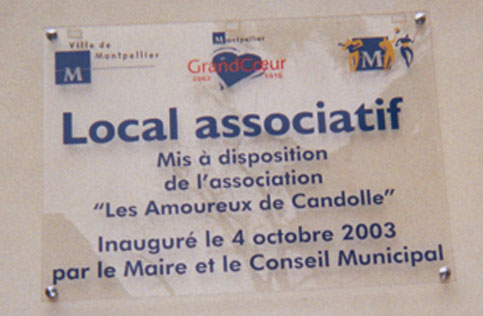
Tribute to a sentimental past
Starting out from the train station I was already familiar with the way to the Youth Hostel: walking up the long Avenue Maguelone one arrives at the enormous plaza, Place de la Comedie, (allegedly the largest in Europe) ringed by buildings constructed in the 2nd Empire style of the mid-19th century,with cafés, restaurants and shops at the ground. A far more prosaic plaza, something of a spinoff from the standard American shopping mall, begins off to one's right at the northern end, the Polygone . Strolling the length of its colorful, indubitably vulgar ambiance, one comes to a recently constructed extension, an esplanade of pillars, fountains and statues dubbed the Anti- gone ! (Perhaps a sort of "anti-polygon" a new idea in mathematics. No connection to Sophocles' heroine. Given the reputation of French civilization, one might interpret this juxtaposition of names as a conflict between polygamy and antigamy ! )

The Antigone
On the left as one enters the Place de la Comedie stands an imposing and ornate 19th century opera house. In my tour of the Old City the guide informed us that it had been built by the same architect who designed the Paris Opera. I remain skeptical. It doesn't have the right feel, somehow , which isn't saying much, given the privileged place of the Paris Opera in the realms of the sui generis .
Posters outside the opera house announced that a run of Rossini's " Italian Girl in Algiers" would begin in April. Whatever my opinions of Rossini, which fluctuate between enthusiasm and boredom, they were of little use now, as I would be gone in a few days. Although the doors were open, the box office was closed. The two young women in the hall were handing out brochures advertising the coming season.
Returning to outdoors and the rain I observed a pair of giant banners suspended from the roof and covering most of the entranceway:enlarged photographs of journalists Florence Aubenas and Hussein Hanoun al-Saadi, missing since January after being kidnapped in Iraq. These banners, with an appeal to the kidnappers, were draped from public buildings in all the cities I visited and no doubt over all of France. ( Mercifully they were released in July. Could France's refusal to cooperate in our "war on terrorism" have had something to do with this? )
I traversed the Place de la Comedie and entered onto the rue de la Loge. Here, in 1988, I raised money for my nights in the Youth Hostel by playing violin on street corners. After only a few yards this street connects with the narrow rue de l'Aiguillerie (Street of the needle-makers.) I doubt that its narrowness has anything to do with the fact that needle factories were located there at one time, (a fortuitous accident of self-referencing.)
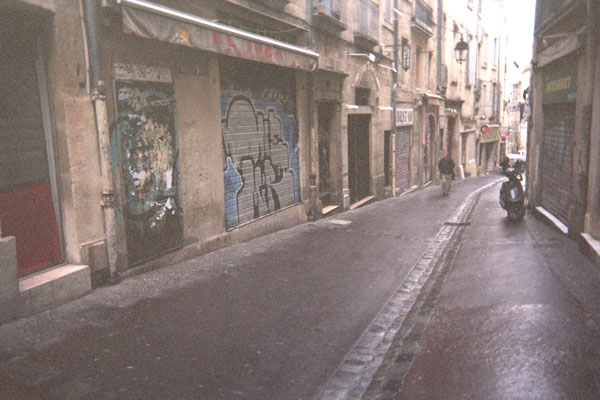
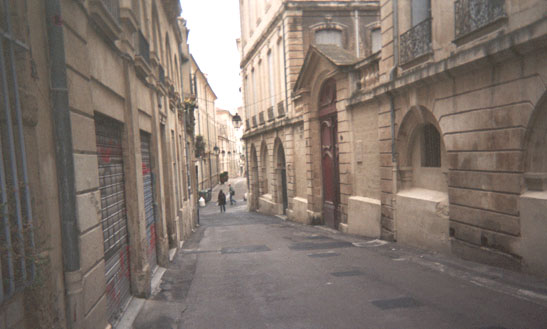
rue de l'Aiguillerie
Getting lost was quite difficult, but I managed to do it. Directions from a couple in the small (but apparently "posh") Place Petrarque ( one imagines that Petrarch may have gone sestina-fishing there) got me back onto the rue de l'Aiguillerie again. From there it is straight (if somewhat twisted) sailing to the the far end where the Youth Hostel sits less than a block away from the northern boundary of the Old City.A few blocks before this intersection the rue de l'Aiguillerie becomes the rue des Ecoles Laiques. It is easy to miss the entrance to the hostel on the tiny rue du Chapeau Rouge to the right. The hostel is enclosed by ancient crumbling walls that continue on to the boundary of the Old City. Once the medieval walls, it is now the Boulevard Louis-Blanc. Unlike the lively restaurant district just above on the rued des Ecoles Laiques, there is absolutely nothing outside the hostel of any interest on the rue du Chapeau Rouge. Apart from hostel residents and children from a nearby lycée , it is deserted most of the time.
Stained glass windows covered with religious iconography line up on the walls of the hostel, which is situated inside a former monastery . Entering the building one climbs a darkened spiral staircase with broad stone steps to reach the reception counter in a dark room on the first floor (French system) . Opening to the right is a much brighter room holding food-dispensing machines, billiard and fussball tables, and the chairs and yellow-enamelled tables of a dining area. A TV suspended from the ceiling by braces in the lower right hand corner is almost always turned on, even when no-one is watching, (a custom in many places that always reminds me of solitary confinement in Danbury prison.)
The receptionist was a tall man in his early twenties with dark hair, dressed in a sweater and blue jeans. I found him more than a little green around the gills, a limitation compensated to some extent by his eagerness and contagious good-will. A Moroccan school teacher sat on a high stool and leaned her arms on the public-access side of the counter. She was the leader of a field trip from some American high school in Tangier. I discovered that she spoke English well and possessed a sense of humor, necessary assets for anyone spending even a few days in this hostel. The Paris office would only guarantee reservations for 2 nights, but there was no problem in arranging to stay another 3.
The decision to spend the whole time in the hostel rather than looking for a hotel turned out to be a wise one. I hadn't realized that this was Easter weekend, nor that all the hotels in town would be packed solid. The hostel would also be filling up to overflowing, but at least my bed was secure ( though VERY negotiable as I would soon discover!) After paying the bill and picking up some sheets and a blanket I was assigned bed #7 in room #7.
Room 7 was large, gloomy and drafty, rain filtering in from the outside through the tall windows. All the beds were double-deckers; bed # 7 rested above #6 in a darkened corner. For me at least the bunk were too high. There was a ladder handy for climbing up into the bed, but the ladder was broken. Picking it up I returned with it to the front desk. Knowingly nodded the desk clerk ! He consulted the register: " Well, okay, you can have bed #6 in room# 6. You'll need a magnetized passkey to get into it." He prepared the key and I was on my way.
The passkey didn't function properly . No malice towards me had been intended; none of the electronic keys in the hostel worked in the first 10 or so swipes. After swiping a key through the notch many times the lock might just decide to give , or it might not. As a general rule the only way to enter a room was to annoy someone on the inside with the sound of the key swishing about,to the point that he would get out of bed and open it for you.
On this, my first night at the hostel, the door was opened by an angry individual in his 30's. I didn't realize at first that he wasn't angry at me. He went back to his bed, #5, the upper tier of the double-decker across the room on the diagonal. Underneath him was the bed to which I'd been assigned, #6. Sitting on it I saw a stocky middle-aged Algerian wearing a navy jacket. When I, rather foolishly, pointed out that I'd been assigned his bed he replied, (in French of course) "No way! this is my bed! That's yours over there." His finger pointed level with the bay windows, across the room to an upper berth that appeared to be empty, bed #7 . I saw the lay of the land and immediately got to work fixing up bed 7 with a fitted and a top sheet.
"How much time you in for?" snarled the individual who'd opened the door for me . My French was more than sufficient to understand very well what he meant, but I pretended that I didn't.
"How many years, guy ? Me! " , he held up the fingers of both hands : "Two times 5!" Uncertain that he was getting through to me, he added " Prison! Him too!" Both he and the Algerian had recently been released from long prison terms and had been temporarily placed in the hostel by social workers. "Prison" being the same word in both French and English I could no longer feign ignorance:
"So?", I replied, "Things are all right here, aren't they?"
"No, they're not." He'd put a real scare into me, and that seemed to satisfy him. Now he left me alone and resumed the conversation he'd been having with the Algerian. They were probably justified in thinking that most Americans, particularly those who inhabit Youth Hostels, had been born yesterday, but that description does not apply to me. I knew they weren't dangerous, nor did I blame them for trying to scare me. All the same it would probably be better all the way around if I found some way to stay out for the rest of the evening; they would be gone by the next day.
On the first floor of the Montpellier hostel one finds a spacious locker room with Italian provenance one-armed bandits that will guard your luggage if you keep feeding them with Euros on a daily basis. Just to be on the safe side I stored everything I was carrying in them, fully aware that it would cost me another Euro later that evening to retrieve what I needed for the rest of the night and the next morning. Travel never did come cheap. Then I walked back out into the rain.
I found it remarkably easy to get lost in the Old City. It was an exhilirating experience, particularly as I recognized that the disorientation would only be temporary. After a random walk of no more than half an hour I was back on the Place de la Comedie. There is a short-order stand on the rue Maguelone that makes up a decent Philadelphia steak sandwich (complete with freiheit fries) for a few Euros. Thus armed I paid admission to the Gaumont theater back on the Place de la Comedie . After some debate I chose (unwisely) a film advertised as the saga of a young, struggling pianist: De Battre Mon Coeur Avant l'Arret ( Let me heart beat until it stops) .
It's one of those dreadfully stupid films about a wretched teen-aged punk caught up in the world of crime, but who plays tolerable piano and decides that he wants to be a concert pianist; something like Goodwill Hunting , ( one of the 10 worst films even made) . As predicted, he won't be able to escape his dire fate. It wasn't so dumb that the audience couldn't laugh at it. After an hour or so I'd had enough and left. In any case the steak sandwich had completely dried me out and I needed something to drink.
Back at the hostel I went into the dining room and sat down at a table. A few residents were seated in front of the TV watching some sports event.I was carrying part of a carton of orange juice had been left over from lunch, together with a roll and a bit of cheese.I decided to finish them off.
Eating any sort of bread with my upper denture in place is quite unpleasant, and I took it out dropped it into a small glass jar, the kind herrings are packaged in, filled with water. Somehow the denture had managed to become wedged solid beneath a ridge circumnavigating the rim of the jar. No amount of ingenious coaxing was able to dislodge the denture, and I was terrified that it might break if treated roughly.Clearly some way had to be found to break theglass.
Back at the registration counter I explained the situation to the young clerk and asked him if the hostel would let me use a hammer. He left his desk to go to the main office, a short distance away on an upper landing. He was away about 20 minutes. When he returned, he apologized: " I'm sorry, the hostel hasn't got a hammer. Can you go outside and use a rock? " I was not about to do anything of the kind. The Moroccan teacher was still in the room and she had a better suggestion:
"Why don't you go to the office yourself and talk to the director?" He was sitting at a cluttered desk in a small room illuminated by a naked light bulb dangling from the ceiling. I sized him up as an intelligent man, probably in his 40's. His amused facial expression told me that life at the Montpellier hostel had made him quite familiar with Murphy's Law. He had strong hands, which always inspire confidence, so I handed over the jar with the trapped denture.
The director held it up to the light bulb: "We'll have to break the glass, won't we?" He opened one of the drawers of his desk and pulled out a large monkey wrench. Then he wrapped the jar inside a brown paper bag, lay the bag on the table and, after gauging a sufficient distance from the denture, began merrily banging away!
With each blow my heart jumped a hundred feet; as a corrective artifact, only my glasses are more essential, the difference being that I'd brought 2 extra sets of glasses with me, but haven't got a spare denture. I wouldn't be returning to the US for another two weeks, and how long would I have to wait for another denture to be made after my return?
Finally there was (like a motif of musique concrète) the unmistakable crack of breaking glass. The director opened the bag: the denture was unharmed and he handed it over to me. "I suggest", he muttered wryly, "that you wash it before putting it back in." Words that could not begin to express my gratitude poured out and were shrugged off, "It was nothing. C'est rien! "
It was time to climb the stairs to occupy my new bed in room 6. I swiped the passkey a dozen times through the lock before someone lost patience and opened the door for me. I stepped into the darkened room to discover that someone was sleeping in my bed. The night clerk had assigned him this bed, he claimed. Yes, I replied, but those are my sheets. He pulled off the top sheet and handed it to me. Then he turned over on his left side and refused to listen to me further.
Back to the front desk where a new clerk was installed, a bit older and less talkative. He picked up a master key and accompanied me back to room 6. His key worked no better than mine did. Once again somebody opened the door from the inside. The clerk felt no embarrassment at switching on the strong ceiling lights. There were 4 other persons trying to sleep in the room; the ex-prisoners at the far left corner, the fellow in my bed, and somebody in the upper bunk of a bed against the wall holding the door.
The ex-prisoners slept on undisturbed; no doubt the daily schedule in prison goes from 5 AM to 9 PM. The man in my bunk was extremely annoyed. However the bed situated below him, #8, was empty and the night clerk indicated that I should use it. Both I and the person in the upper bunk pointed out to him that personal items were strewn all around the bed, indicating that someone else considered it home.
"No;I know who those things belong to; they're the 'Mexican's' . He's moving out tonight. I'll talk to him." With considerable misgivings I moved the personal effects of this person, whoever he was, onto a table in the middle of the room, then climbed into the bed and under the sheets.
Sure enough, at around 1 PM one heard the swishing sound of a magnetised passkey being passed through the lock a dozen times. This time the door did open of its own accord and the "Mexican" stepped into the room . He walked quickly over to where I was trying to sleep "That's my bed" , he said, pointing at me and snarling.
Not to give the wrong impression, the 'Mexican' is a young, very shy, wandering street painter who speaks no French or English, some Italian and mostly Spanish. He apologized numerous times for all the trouble he was causing me, but he held his ground. This was his bed and he needed to get to sleep. I got out of bed and indicated that I was very angry; not at him but at the hostel management. Together we moved his things back to the area around the double-decker, before I made yet another trip to the front desk.
Yet another night clerk was there to greet me: fat, crew-cut, more day-laborer than student, no nonsense to him . He retrieved the master key again and we returned to room 6. His technique was to jam the key-card into the notch and ram the door with his knee simultaneously. It worked to perfection; the door gave way and we stepped inside. Once again he switched on all the lights.
By now the room was in an uproar. The night clerk spoke with the much put-upon individual in bed #7, then with the young street artist. His eyes darted about the room to discover a bed that wasn't being used. Although there wasn't anyone in bed #4, it had been made up properly with sheets and blankets. He pointed there and said:
"Use that one!"
" What happens if the bed is already claimed and its occupant comes in later?"
"He won't. The hostel closes at 2." Then he swore: "That's the system! The empty bed, that's the one you use!!"
Then he stomped out of the room and slammed the door. No one showed up later to claim bed #4 , and we all slept through the rest of the night.
Right after breakfast the next morning I visited the front desk and watched as the clerk officially entered my name into the books, as the occupant of bed #4 for the duration. Yet Murphy's law was still in effect: two days later all the tenants in room 6 were forced to move to room 8 to accomodate the overflow from contingents of high school girls arriving for the Easter holidays.
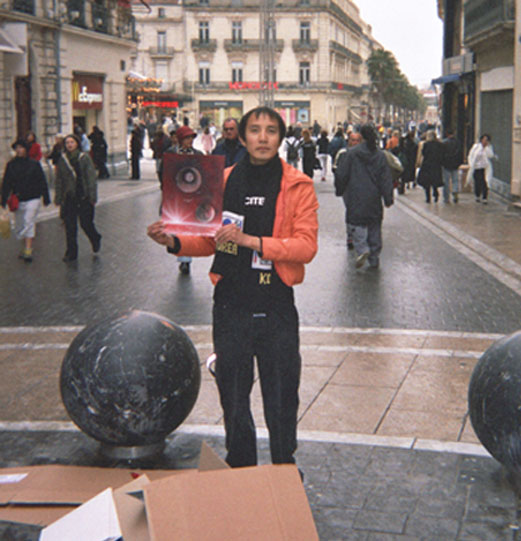
The Mexican, plying his trade in the Place de la Comedie
Day 17, March 24th:
A good feature of the Youth Hostel is its breakfast, served free of charge to all residents from 7:30 to 9 each morning: corn flakes, bread with butter and jelly, tea, coffee or hot chocolate, a saving of 5 Euros per day on a tight budget. I got into the habit of drinking a cup of hot chocolate at the hostel, then taking an expresso around 10 at La Vielle Porte , a café at the intersection of Blvd Louis Blanc and Blvd Pasteur on the northern rim of the peripheral avenue circling the Old City.


As indicated by its name, La Vielle Porte stands beside one of the former gates in the walls of the medieval city, on the rue de l' Université , with the law school just above and the famous school of dance on the boulevard to the left. This description may conjure up a misleading set of images in the minds of Americans. The rue de l'Université is a tiny trickle of a street that descends precipitously from the administrative district of Montpellier, ( post office, police headquarters, and the shopping districts around the rue de la Loge and the Place des Martyrs de la Resistance.) The law school is distributed through a collection of stone buildings of various ages going back to the 12th century off to the right - as unlike Boalt Hall or Harvard Law School as one can imagine.
One is surprised to find within the precincts of these crumbling walls, and streets so narrow that only a horse or two at a time could have passed through them, an up-to-date law school, a nine hundred year old medical school, and world-renowned conservatories of music, drama and dance. Montpellier is the dance capital of France; it takes some imagination to comprehend that modern dance is being performed and taught behind facades evocative of film epics of the Crusades!

The School of Dance
One glance at the rue de l'Université is enough to convince anyone that it has to be photographed.
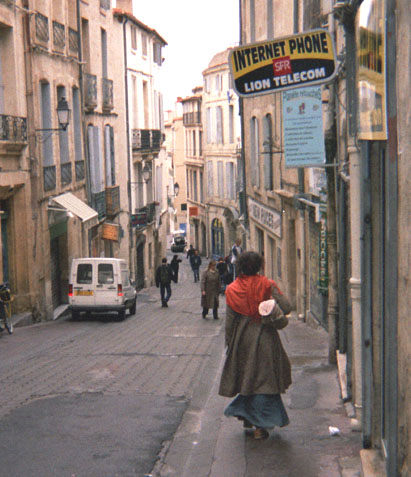
All the disposable cameras I'd brought with me from the States had been used up in Paris. Noticing a bookstore at the top of the street I entered through the door. The man behind the desk was middle-aged with thinning hair, someone who impressed me as being a pleasant individual:
" Monsieur, s'il vous plait, je cherche un magasin pour acheter un caméra."
He looked up at me, and frowned: obviously something was wrong with my question. His reply was delivered in an unmistakable London accent: "Sir, do you mean a camera or a film camera? " I'd walked into an English language bookstore! He went on , "In French, caméra means a film camera; a hand camera is called an appareil photographique." When I told him I just wanted to take some pictures, he indicated a shop around the corner in the rue de la Loge. We conversed briefly: he asked me about Shakespeare & Company which he' d visited a few times. I promised to come back later to browse. His wife was running the store when I came back the next day. I picked up a used copy of Tracy Chevalier's first published novel, "The Virgin Blue", a frank disappointment after her achievement in "Girl with a Pearl Earring".
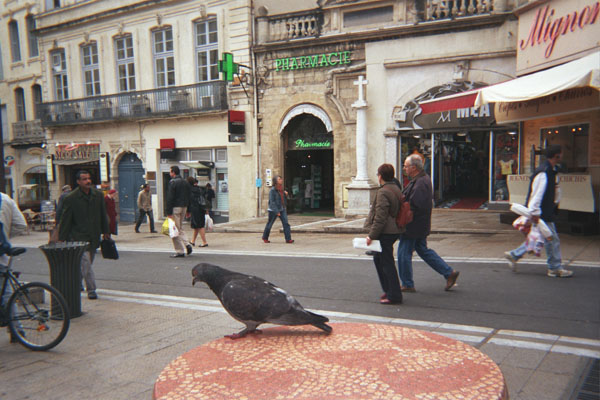
rue de l'Université
La Vielle Porte is at the very bottom of the rue de l'Universite. The two waitresses at La Vielle Porte come from the farming region around Montpellier. (Alexandre Grothendieck himself lived and worked as a teen-ager for several years after the war). They had an aggressive, friendly manner and I asked for permission to take their pictures:
"No! Absolutely not!" one of them said, then posed
for the shot.
"No Internet!" she cried.I have interpreted her request in the same spirit as her refusal to have her picture taken.
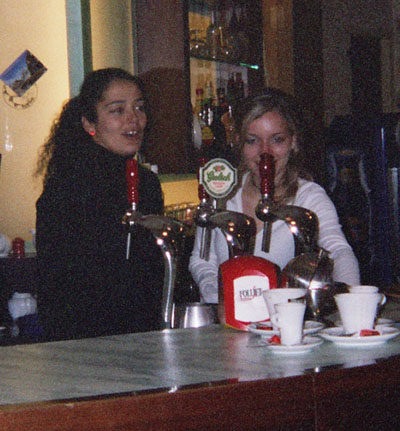
At the intersection with the rue de l'Université the Boulevard Louis Blanc turns into the Boulevard Pasteur. Continuing along it one comes to the precincts of the Medical School.
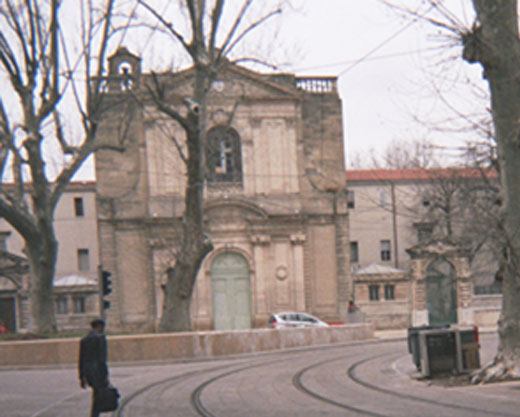
This is the oldest continuously active medical school in Europe; the one at Salerno , Italy was established earlier but ceased operations in 1811 . Montpellier's school was also closed for short periods during the various wars and revolutions, but instruction continued in private. Rabelais took 7 years getting a degree there (1537), which comes as no surprise considering how lazy writers are. Administration, library and museums of Montpellier's medical school are clustered together in a handsome building in the neo-classic style of the 18th century.
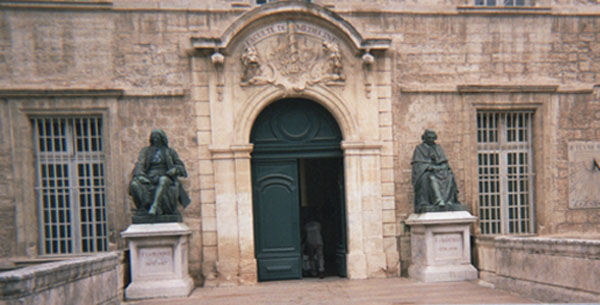
Staircase and doors at the entranceway are flanked on each side by bronze statues of stodgy old male bureaucrats with wigs.
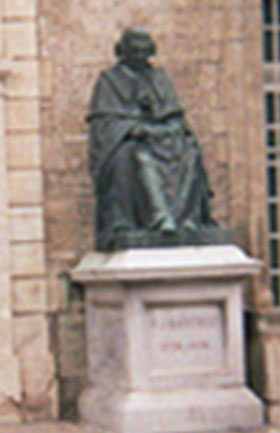
The library on the 2nd floor dates from the same period and does not appear to have undergone many changes in the interim. Rows of tables and hard wooden benches were crowded with students. Two librarians sat, Minos and Radamanthus, at a raised desk at the head of the room. One of them gave me a handout detailed the chronology of the medical school from the 11th century to the present:
It was founded by the 7th lord of Montpellier with the name of Guilhem, in 1180, under remarkably democratic conditions: "Any man, whoever he may be, or whatever his origins, can, without fear, study at the school of medicine." Of course this didn't include women. It certainly did include Moslems and Jews, in the uniquely tolerant world of medieval Montpellier. Indeed, one of the main causes for locating a medical school here was the proximity of the superior traditions of Islamic and Jewish medicine in the neighboring kingdoms of Aragon and Granada.
The school survived the wars of religion. The Hugenot king, Heni IV came from this region and increased its endowment. It was not until 1792, when all the universitues across France were closed down by the Jacobins, that the school temporarily ceased functioning. Instruction continued privately and in secret for the next 3 years. In 1794, renamed the "School of Health", it was opened again at the same time as the medical schools in Strasbourg and Paris. The school was closed down again by during the German occupation in 1944. Reopened after the war, it has been in continuous operation ever since.
The next hour or so was passed in the medical school library putting together these notes. I would soon discover that Montpellier is particularly rich in libraries, both ancient and completely up to date.
Adjacent to the administration building, further along on the same street ( rue de l'Ecole de Medicine ) stands the imposing Gothic Cathedrale St. Pierre, its entrance supported by tall, cylindrical, completely unadorned unadorned pillars capped with turrets.
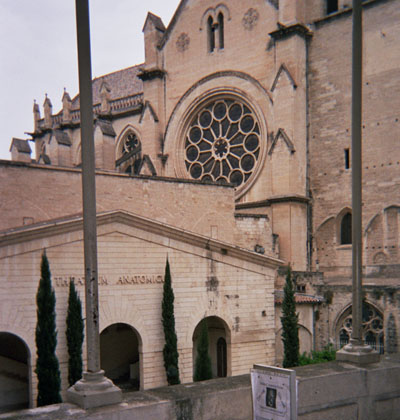
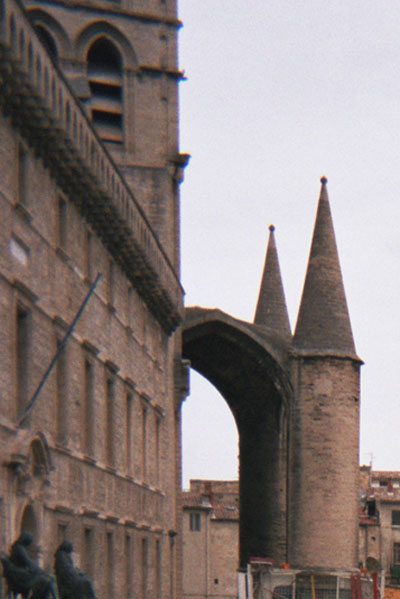
The Cathedrale St. Pierre
There are several other churches in this locale as well in a variety of styles. As every religious establishment without exception had been destroyed in the wars of the religion of the 16th to 18th centuries, they are all reconstructions. Leaving the medical school I returned to the Boulevards to board the Tramway.
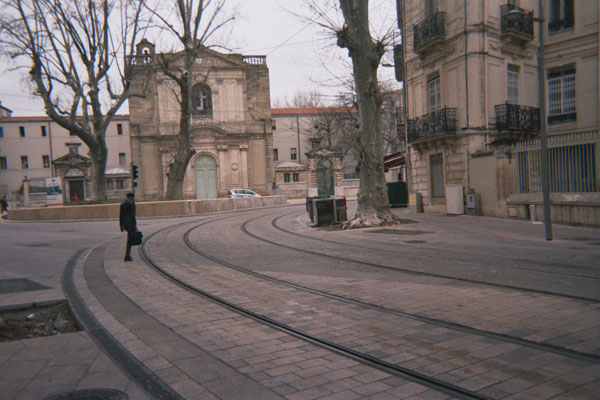
Imagine a pair of identical polished porcelain blue vehicles, shaped like the front end of a jetliner, joined anti-symmetrically, giving the whole construction the shape of an elongated trapezoid
Pedantic note: What one calls 'symmetry' in geometry is actually 'anti-symmetry' in algebra. If x is a point on the left vehicle, then -x is its corresponding point on the right!
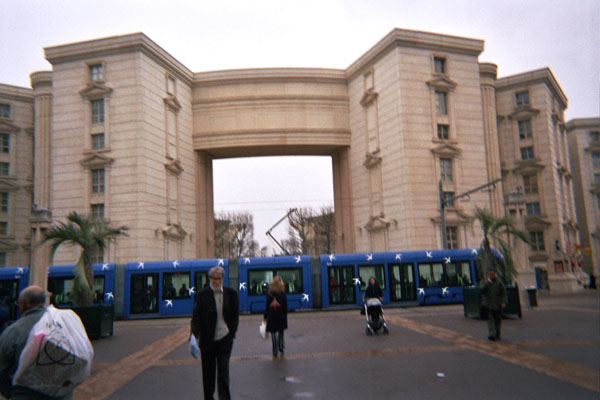
An electrical train, virtually noiseless and pollution-free, it rolls along a track ,(roughly straight with a sizable detour to take in the train station and Place de la Comedie) of many miles through the northern region of greater Montpellier.
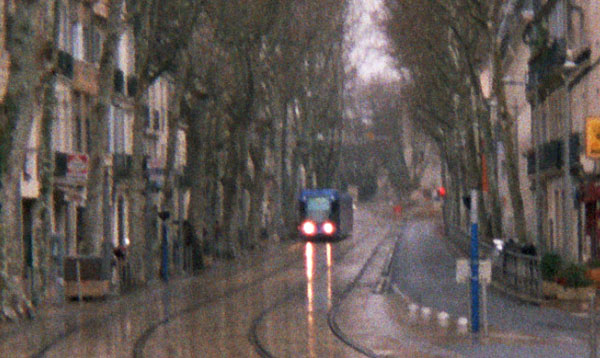
Tramway in the rain
Starting from its easternmost station at the Odysseum (Montpellier's Planetarium) , it accesses the Antigone, the Polygone, the train station, Place de la Comedie, the Corum ( a large convention center), the medical school, and the newer ( and crappier) buildings of the Université Paul Valery about 5 miles away. From there it weaves a furrow through the western suburbs. These are undergoing dramatic development, with buildings, apartment complexes, highways, shopping and business districts rising up at a tremendous rate. Twenty-first century Montpellier is the beneficiary of a dynamism that, (citing once again our tour guide) has not been seen since the days of Guilhem VII in the 12th century, when it was a thriving metropolis as a consequence of its vineyards to the north, and the pilgrims' route to the shrine of Santiago de la Compostella on the south.
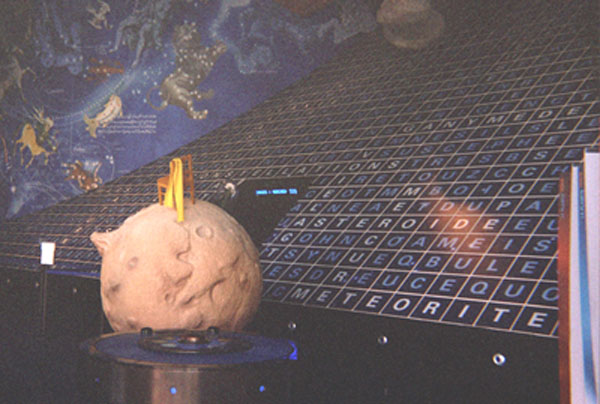
The Odysseum
From the Odysseum the cost of a round-trip on the Tramway, with return anywhere along the line is 2 Euros, 30 centimes, and well worth it.

Vegapolis, the American "bar" adjacent to the Planetarium.
The owner hid his face when I started taking pictures,
but the barmaid wasn't so shy!

After taking lunch, visiting the Université Paul Valery, (to be described in the next installment) and returning to the train station, I immediately undertook another long journey of exploration. This took me through the shopping malls of the Polygone, followed by the magnificent procession of arcades, esplanades and fountains of the Antigone, all the way out to my destination: the Médiathèque Central de l'Agglomeration Emile Zola at the far end.
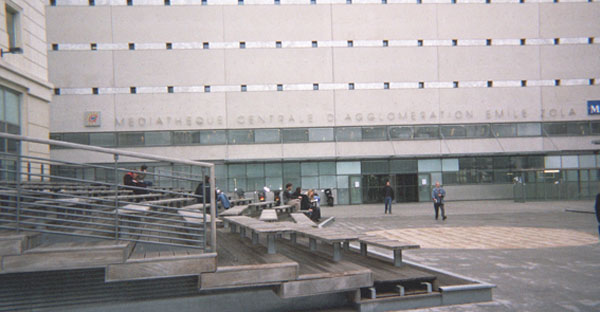
Médiathèque Emile Zola
As the name indicates, a "médiathèque", is a library with additional resources for modern media technology, films, DVDs, CDs, Internet, word processors, etc. Beyond the lobby at the entranceway one finds a dining area with tables and chairs surrounded by food and beverage dispensing machines along the walls. Continuing past this one comes to a large auditorium, a kind of warehouse with chairs arranged on bleachers in raised tiers.
I arrived there just around 5, just in time to watch a film, a documentary( directed by Dominique Rabourdin and produced by the Centre Nationale du Livre (CNL) and Arte) put together from interviews (in Russia and Germany) with 12 Russian writers. ( I give the French transliterations of their names, since I don't know the English versions) : Nikolai Chadrine; Andrei Guelassimov; Leonid Guirchovitch; Natalia Jouravliova; Nikolai Kononov; Ilya Kotcherguine; Iouri Mamleiev; Nikolai Maslov; Ludmilla Oulitskaia; Vera Pavlova; Lev Rubinstein; Olga Sedakova.
This 2-hour film is superb and should be acquired by PBS. It introduced me to a literature I knew little about but am now resolved to learn more. A panel discussion was scheduled following the film, with readings by and discussions with novelist Svetlana Alexievitch and poet Olga Sedakova. Most of the audience remained after the showing of the film, and in a short time the auditorium was packed with new arrivals. Unfortunately we now had to wait an hour for the speakers to show up. After 2 hours of a film I was not prepared to spend another 3 hours sitting in the same place. Before I got up to leave I was able to hear Alexievitch read from her novel about Chernobyl and hear Sadakova (Voyage to Tartu ) talk a little bit about her poetry in the context of Russian history.
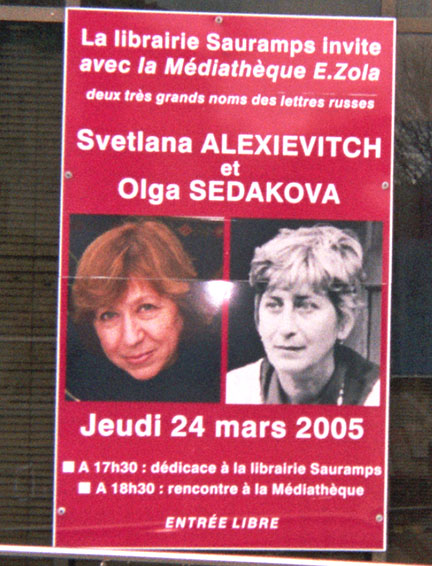
An adequate dinner was assembled from items bought in the open markets around the rue de la Loge . Compared to the previous night, the Youth Hostel was peaceful. Later I left to attend a student graduation performance at the Louis Jouvet theater school, a pastiche compiled from short plays by Strindberg.
